Blame in English: A Guide to Grammar, Idioms, Collocations and Synonyms
The ability to assign responsibility and discuss accountability effectively separates intermediate English users from those who communicate with true fluency and cultural awareness. Through systematic examination of grammatical patterns, semantic relationships, and idiomatic usage, this guide will develop your mastery of "blame in English," enabling you to navigate complex discussions about fault and consequences across diverse social and professional situations.
- I. What is Blame in English?
- II. Common usage of Blame in English
- III. Differentiate between Blame for, Fault and Accuse of
- IV. Collocations of Blame in English
- V. Synonymous words/phrases to Blame in English
- VI. Idioms including Blame
- VII. Frequently Asked Questions about Blame in English
- VIII. Conclusion

I. What is Blame in English?
The word "blame" serves as both a fundamental building block and a sophisticated tool in English communication, appearing frequently in conversations about responsibility, mistakes, and accountability across various social and professional situations.
1. Definition
What is Blame in English? According to the Cambridge Dictionary, Blame functions both as a verb and a noun in English. Blame implies attributing responsibility or fault to something or someone (for doing something wrong). For example:
- She blamed her lateness on the traffic. ⏩ Blame serves as a verb.
- The blame for the project’s failure rests with the inexperienced team. ⏩ Blame serves as a noun.
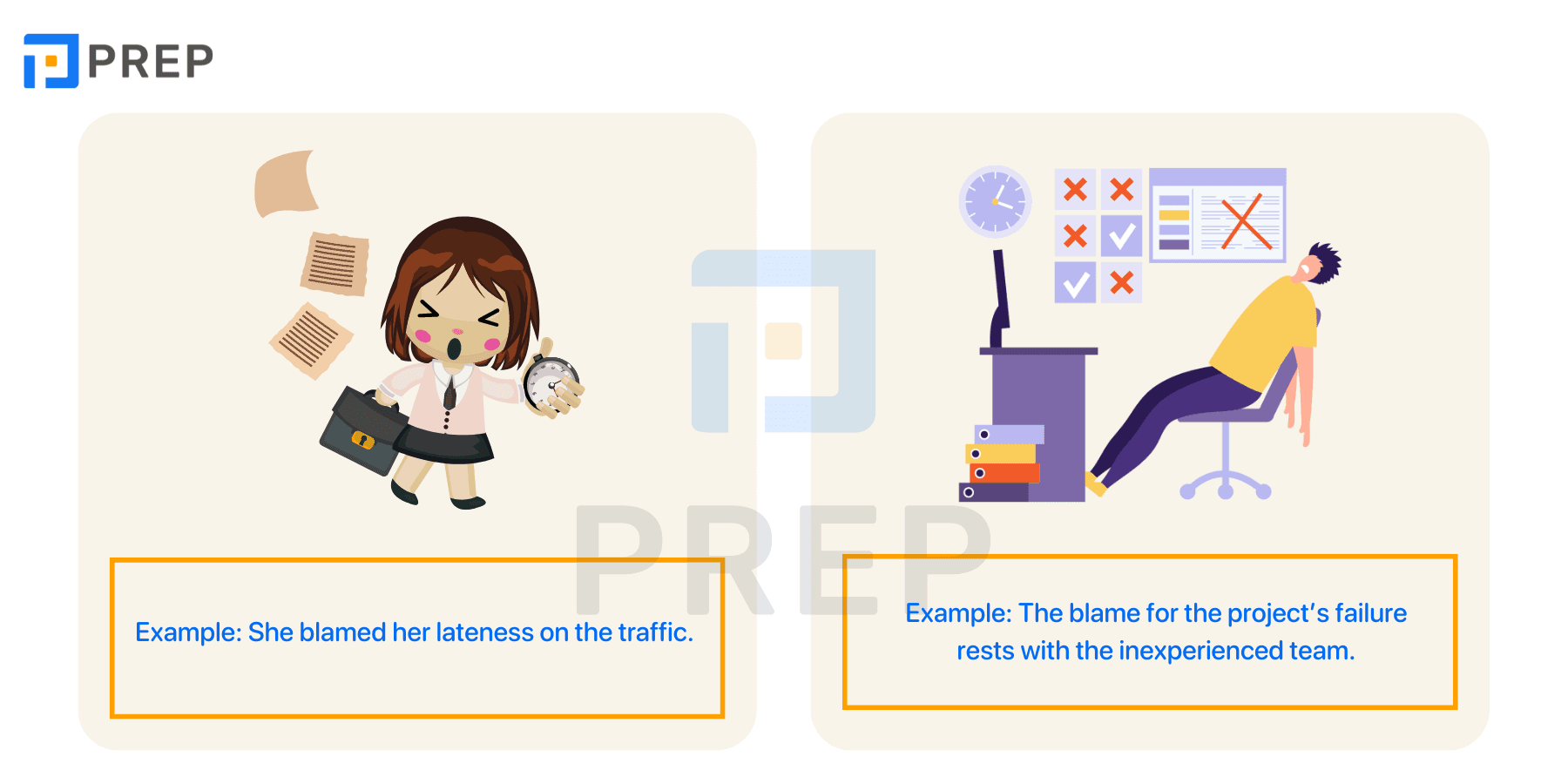
2. Word family
In addition to Blame functioning as both a verb and a noun, let's explore the types of words included in the word family of the Blame in English. Here are some words that belong to the word family:
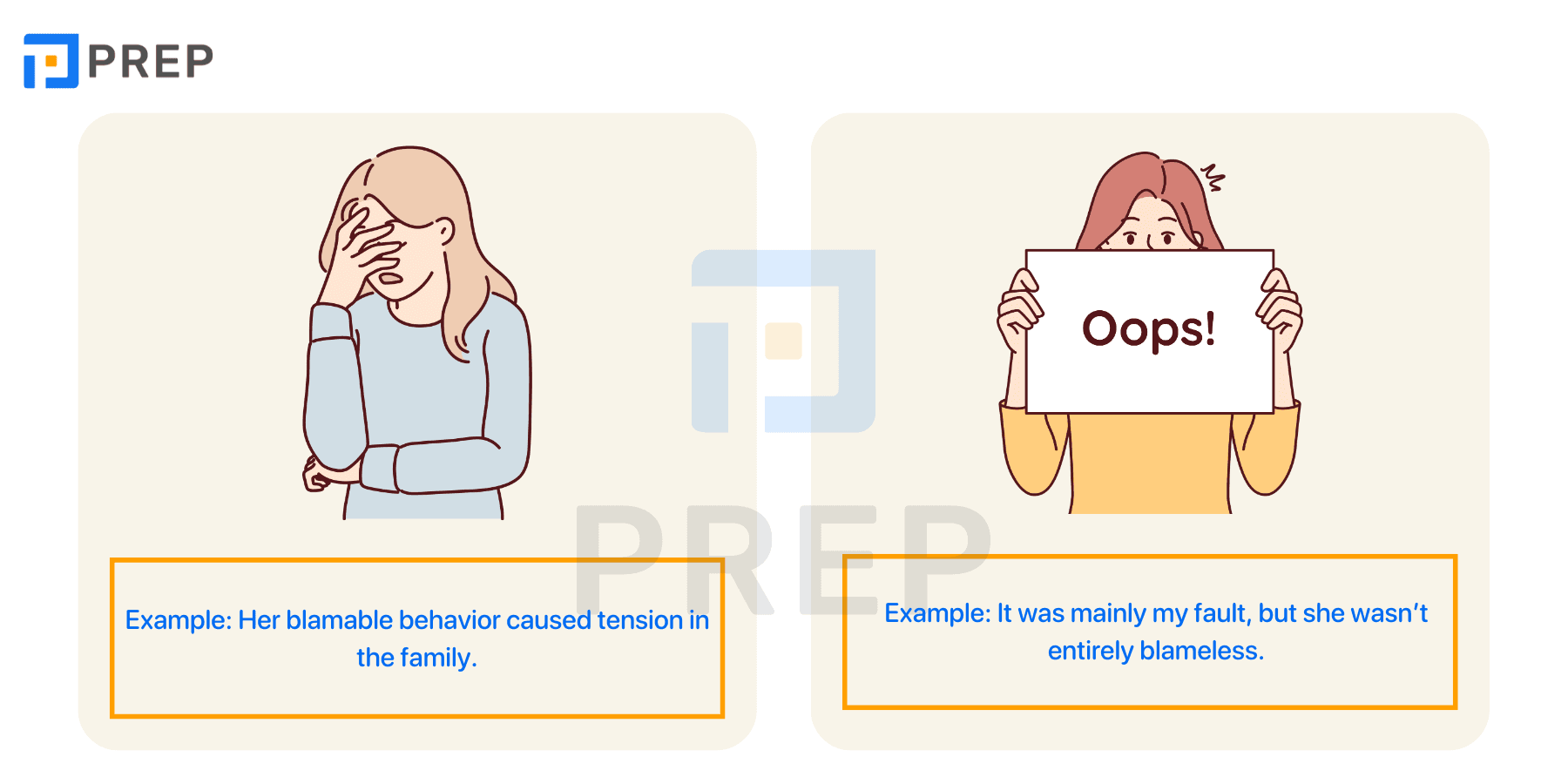
|
Family word of Blame in English |
Meaning |
Example |
|
Blameworthy (adjective) |
deserving criticism and blame; responsible for doing something wrong |
His blameworthy actions resulted in serious consequences for the company. |
|
Blamable (adjective) |
Her blamable behavior caused tension in the family. |
|
|
Blameless (adjective) |
doing no wrong; free from responsibility for doing something bad |
It was mainly my fault, but she wasn’t entirely blameless. |
|
Blamelessly (adverb) |
without doing wrong; without responsibility for doing something bad |
I believe that I behaved blamelessly throughout. |
II. Common usage of Blame in English
Blame has several common ways of usage. Let's explore them below, along with specific illustrative examples:

|
The usage of Blame in English |
Example |
|
Blame somebody/something |
She always tries to blame someone else when things go wrong. |
|
Blame somebody/something for something |
They blamed the bad weather for the cancellation of the outdoor event. |
|
Blame somebody/something for doing something |
Don’t blame her for leaving the party early; she wasn’t feeling well. |
|
Blame something on somebody/something |
He tried to blame the computer malfunction on a virus, but it was actually a hardware issue. |
III. Differentiate between Blame for, Fault and Accuse of
The "Blame for", "Fault", and "Accuse of" structures are frequently confused with each other in terms of usage. What are their similarities and differences? Let's clarify them with the guidance of PREP:
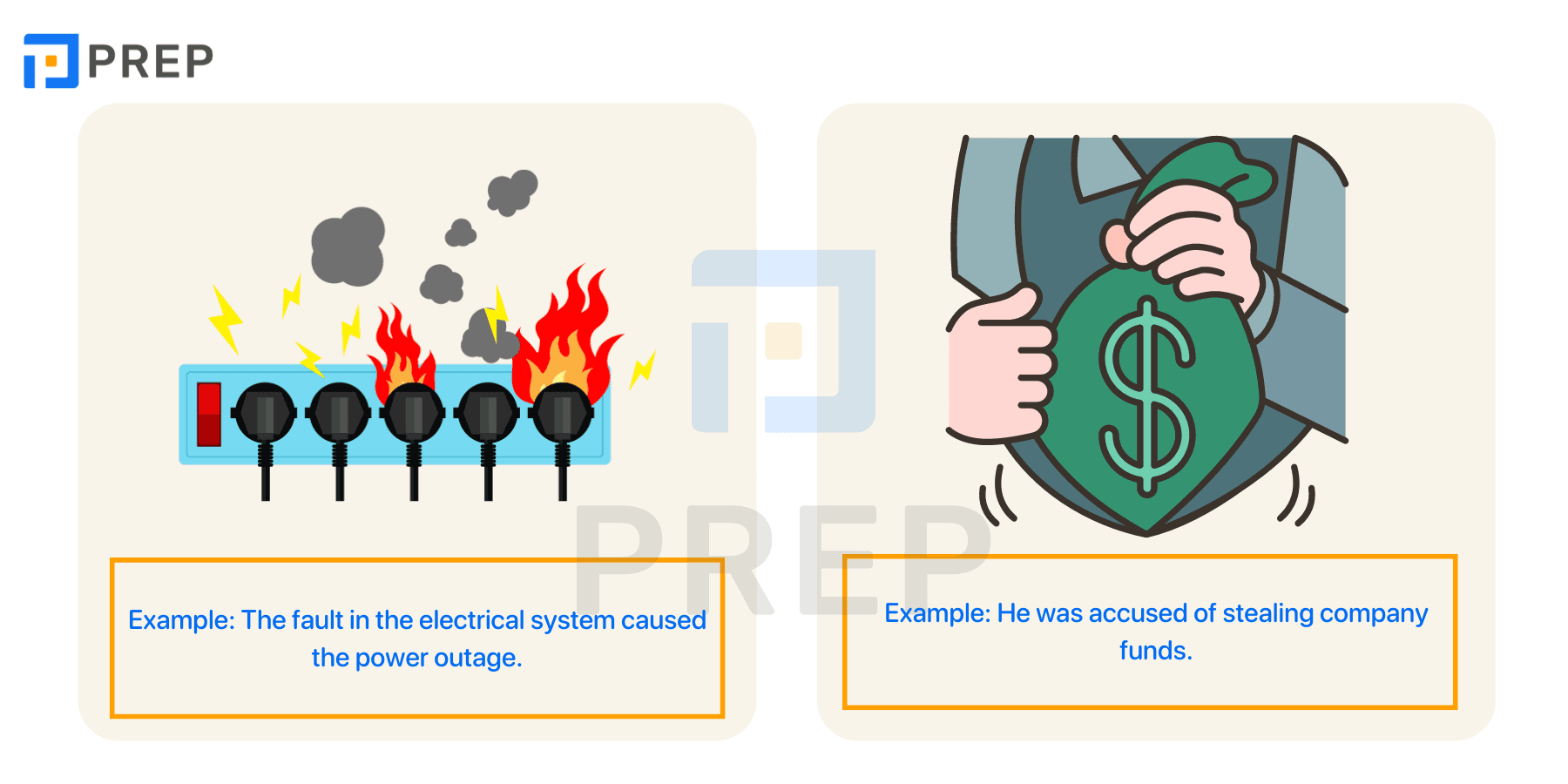
Similarities: "Blame for", "Fault", and "Accuse of" all relate to attributing blame or assigning responsibility for a particular situation or behavior.
Differences:
|
Blame for |
Fault |
Accuse of |
|
|
Meaning |
Blaming/assigning responsibility to someone or something for an event or an undesirable situation. |
Attributing responsibility for an undesirable situation or an incident. It often does not involve blame but simply identifying the cause or origin of a problem. |
Accusing someone of committing a specific behavior or a specific offense. |
|
Word class |
Verb phrase |
Noun |
Verb phrase |
|
Structure |
|
Used as a noun |
|
|
Example |
She blamed her lateness for the meeting on the heavy traffic. |
The fault in the electrical system caused the power outage. |
|
IV. Collocations of Blame in English
When combining Blame in English with other words, we have various collocations. Let's explore them with the guidance of PREP:
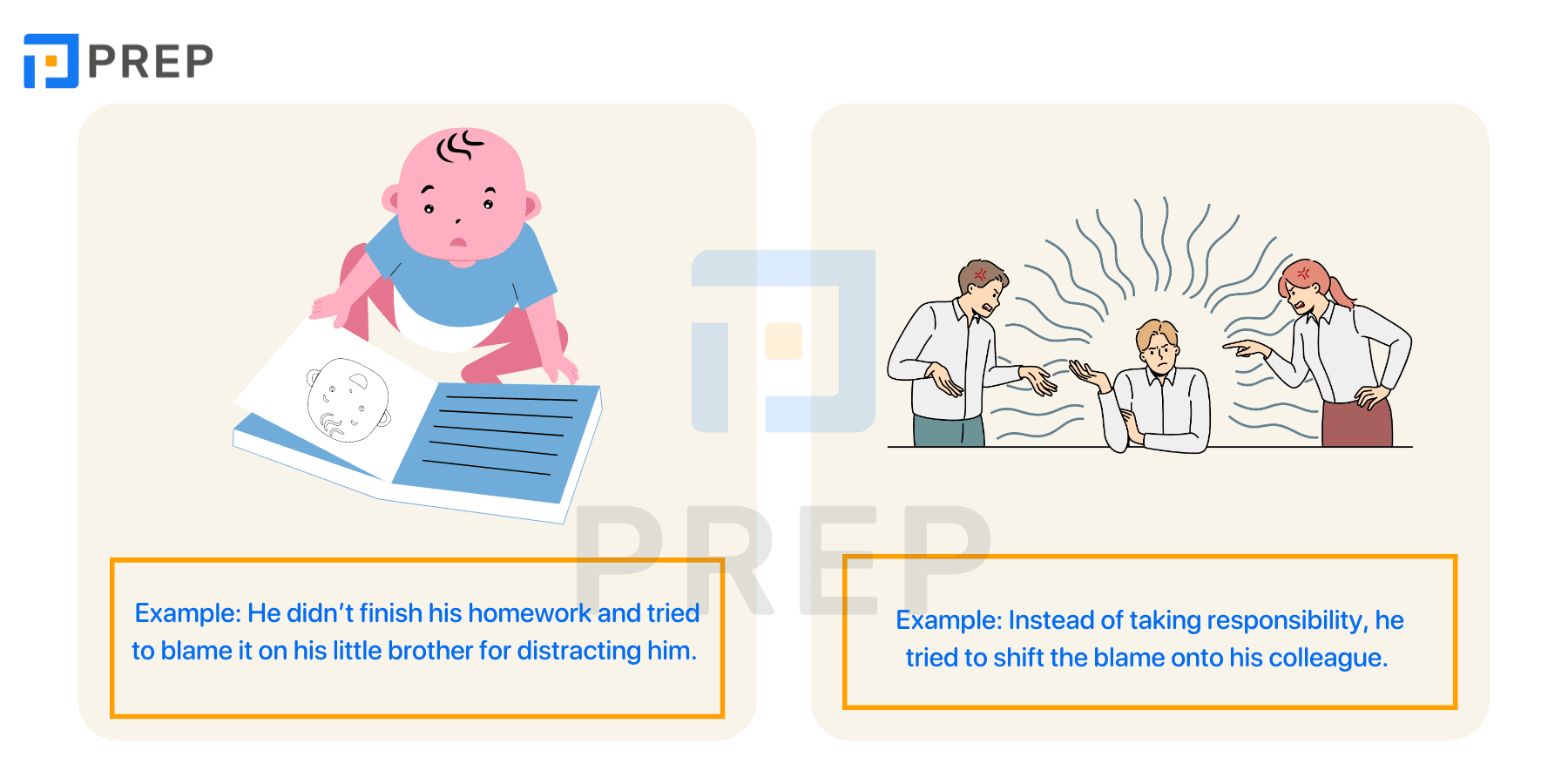
|
Collocations of Blame in English |
Example |
|
Get/take/accept/assume the blame (for something) |
She decided to take the blame for the team’s mistake to protect her colleagues. |
|
Lay/put/pin the blame (for something on somebody) |
He tried to put the blame for the project’s failure on the contractor, but it was a result of poor planning |
|
Shift/blame the blame |
Instead of taking responsibility, he tried to shift the blame onto his colleague. |
|
Deserve the blame |
If you didn’t complete the assigned task, you deserve the blame for the project’s delay. |
|
Escape/avoid blame |
He always tries to avoid the blame for his mistakes, which doesn’t help him learn from them. |
|
Place/put the blame |
The investigation placed the blame for the accident squarely on the company’s safety procedures. |
|
Blame it on (somebody) |
He didn’t finish his homework and tried to blame it on his little brother for distracting him. |
V. Synonymous words/phrases to Blame in English
Understanding the subtle distinctions between these related concepts enhances your precision in English communication, particularly when discussing responsibility, accountability, and wrongdoing in various contexts from casual conversations to legal proceedings.

|
Synonymous words/ phrases to Blame |
Meaning |
Example |
|
Accuse |
to say that somebody has done something wrong or is guilty of something |
Tom accused Mary of stealing his wallet. |
|
Culpable |
responsible and deserving blame for having done something wrong |
The investigation found that Tony was culpable for the embezzlement of company funds. |
|
Guilty |
feeling ashamed because you have done something that you know is wrong or have not done something that you should have done |
After a fair trial, the court found him guilty of the crime. |
|
Censure |
to criticize somebody severely, and often publicly, because of something they have done |
The committee censured the employee for violating company policies. |
|
Fault |
the responsibility for something wrong that has happened or been done |
The fault for the mistake in the report lies with the editor. |
|
Accredit (with) |
to believe that somebody is responsible for doing or saying something |
The success of the campaign can be accredited to their marketing team. |
|
Impute (to) |
to say, often unfairly, that somebody is responsible for something or has a particular quality |
The article imputed the company’s financial troubles to mismanagement. |
|
Attribute (to) |
to say or believe that something is the result of a particular thing |
The success of the event can be attributed to careful planning and execution. |
|
Point the finger at |
to accuse somebody of doing something |
Instead of pointing the finger at others, she should reflect on her own actions. |
|
Hold accountable |
responsible for your decisions or actions and expected to explain them when you are asked |
The government should hold accountable those responsible for the environmental damage. |
|
Lay the responsibility on |
Set responsibility, see someone as responsible |
They laid the responsibility for the project’s success on the dedicated team. |
|
Be responsible |
having the job or duty of doing something or taking care of somebody/something, so that you may be blamed if something goes wrong |
As the project manager, she is responsible for ensuring the project’s success. |
|
Hold responsible |
Set responsibility, see someone as responsible |
The company held the manager responsible for the project’s failure. |
|
Be at fault |
the responsibility for something wrong that has happened or been done |
The mechanic admitted that he was at fault for the car’s engine failure. |
|
Be someone’s fault |
|
It’s not your fault that the project failed; it was a team fault. |
VI. Idioms including Blame
Idiomatic expressions involving blame appear frequently in conversational English, and understanding these phrases significantly improves your ability to comprehend native speakers and participate naturally in discussions about responsibility and accountability.
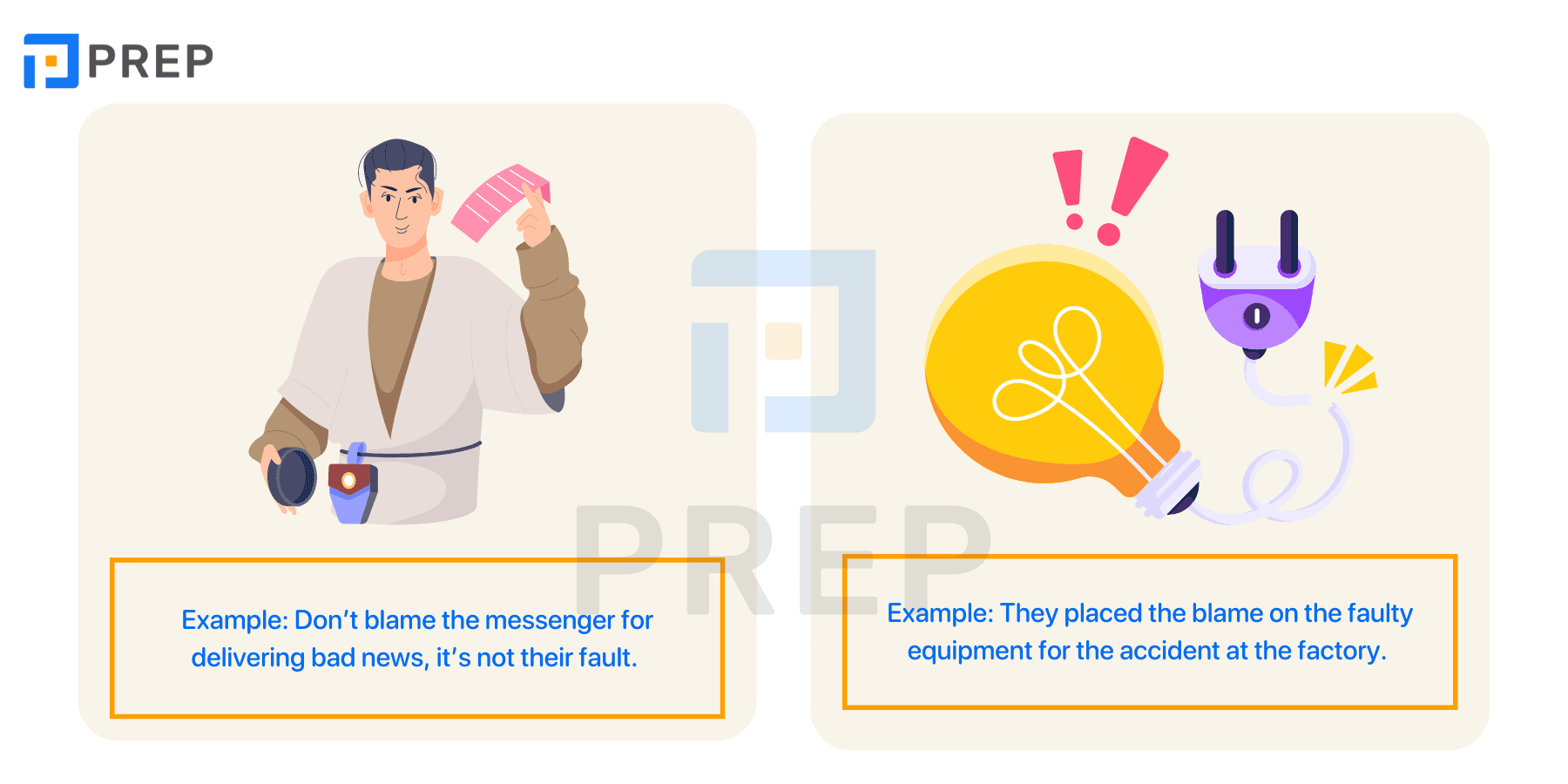
|
Idioms including Blame |
Meaning |
Example |
|
Have (got) only yourself to blame |
to be responsible for something bad that has happened |
If you didn’t study for the exam, you have only yourself to blame for the poor grade. |
|
Play the blame game |
a situation in which people try to blame each other for something bad that has happened |
Instead of finding solutions, they just play the blame game and argue about who’s at fault. |
|
Lay the blame at someone’s door |
Lay the blame at someone’s door |
She always lays the blame at her colleague’s door when things go wrong in the office. |
|
Blame it on the rain |
Shift responsibility or attributing a situation or outcome to external factors beyond one's control |
He didn’t complete the project on time and tried to blame it on the rain, but that excuse didn’t work. |
|
The blame lies (with someone) |
Indicate that someone is responsible or at fault for a particular situation or problem |
The blame for the security breach lies with the IT department, which failed to update the system. |
|
The blame rests with |
Attribute fault for a particular situation |
The blame for the accident rests with the reckless driver who ran the red light. |
|
The finger of blame |
if the finger of blame/suspicion points or is pointed at somebody, they are suspected of having committed a crime, being responsible for something, etc. |
In times of crisis, people often point fingers of blame at those in leadership positions. |
|
Blame the messenger |
hold someone responsible for delivering bad news or unfavorable information, even though they are not the cause of the problem itself |
Don’t blame the messenger for delivering bad news, it’s not their fault. |
|
Shoulder the blame (for something) |
Take on or accept responsibility for a mistake, problem, or wrongdoing |
She was willing to shoulder the blame for the team’s mistake and apologized to her manager. |
|
Place the blame on (someone or something) for (something) |
Attribute responsibility or fault to a specific person, group, or thing for a particular situation or problem |
They placed the blame on the faulty equipment for the accident at the factory. |
VII. Frequently Asked Questions about Blame in English
1. What does blame you mean in English?
"Blame you" means to hold you responsible for something bad that happened. For example, "I don't blame you for being upset about the cancelled meeting" suggests the speaker understands your reaction is justified.
2. What is blame meaning in english?
Blaming is the ongoing process of assigning responsibility for problems:
- Active blaming: "Stop blaming others for your mistakes"
- Continuous blaming: "The blaming started after the project failed"
- Habitual blaming: "His constant blaming creates workplace tension"
3. What is the synonym of blame?
| Synonym | Context | Intensity Level |
|---|---|---|
| Censure | Formal/Professional | Moderate |
| Condemn | Moral/Ethical issues | Strong |
| Reproach | Personal disappointment | Mild |
| Find fault with | Casual criticism | Mild |
4. How to blame in English examples?
Three main patterns exist:
- Direct blame: "She blamed him for the confusion"
- Transferred blame: "Don't put the blame on the weather"
- Identified blame: "Poor planning is to blame for these delays"
Choose based on your relationship with the audience and situation formality.
VIII. Conclusion
The word blame in English operates as both a linguistic bridge and a cultural gateway, connecting simple vocabulary knowledge to sophisticated English expression. Your mastery of its grammatical patterns, idiomatic uses, and semantic nuances transforms everyday conversations about responsibility into opportunities for precise, confident communication.
This foundation empowers you to navigate accountability discussions with the finesse that distinguishes fluent speakers, whether in boardrooms, classrooms, or casual conversations where understanding fault and responsibility becomes essential for meaningful dialogue.

Hi I'm Chloe, and I am currently serving as an Product Content Administrator at Prep Education. With over five years of experience in independent online IELTS study and exam preparation, I am confident in my ability to support learners in achieving their highest possible scores.
Comment
Premium content
View allPersonalized roadmap
Most read












